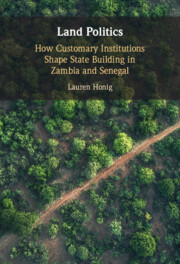Book contents
- Land Politics
- Land Politics
- Copyright page
- Contents
- Figures
- Tables
- Acknowledgments
- 1 Introduction
- 2 Plot by Plot
- 3 Why Institutions Matter
- 4 The Institutional Foundations of Land Authority in Zambia and Senegal
- 5 The Unofficial Differences among Official Chiefs in Zambia
- 6 Holding Ground in Senegal
- 7 Exit or Engagement
- 8 Conclusion
- Book part
- References
- Index
7 - Exit or Engagement
How Status within Institutions Impacts Smallholder Titling
Published online by Cambridge University Press: 11 August 2022
- Land Politics
- Land Politics
- Copyright page
- Contents
- Figures
- Tables
- Acknowledgments
- 1 Introduction
- 2 Plot by Plot
- 3 Why Institutions Matter
- 4 The Institutional Foundations of Land Authority in Zambia and Senegal
- 5 The Unofficial Differences among Official Chiefs in Zambia
- 6 Holding Ground in Senegal
- 7 Exit or Engagement
- 8 Conclusion
- Book part
- References
- Index
Summary
Chapter 7 shifts focus to the citizen level in both countries, identifying how customary institutions impact smallholder land titling. It shows that titling is not an economic decision alone; it is also a strategic choice between engaging with the customary institution or the state. This updates conventional approaches to land titling, which assume that all citizens want state titles but are constrained by a lack of financial resources. The chapter elaborates the argument that institutions impact demand for state property rights by establishing different levels of customary privilege within a community. It then reveals common patterns within the diverse customary institutions in Zambia and Senegal, that smallholders with customary privilege are less likely to have titles. Two potential mechanisms are considered: increased tenure security and concern for collective costs. These findings suggest that customary institutions shape citizens’ engagement with the state through access to titles and privilege within the community.
Keywords
- Type
- Chapter
- Information
- Land PoliticsHow Customary Institutions Shape State Building in Zambia and Senegal, pp. 244 - 277Publisher: Cambridge University PressPrint publication year: 2022

